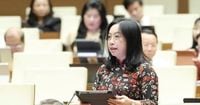Starting July 1, 2025, Vietnam will implement a significant overhaul in its tax and social insurance systems, aiming to simplify administrative processes and enhance protections for workers. Key changes include the use of personal identification numbers as tax codes, stricter enforcement against social insurance evasion, and urgent calls for wage reforms to support vulnerable workers.
One of the most transformative shifts involves replacing traditional tax codes with personal identification numbers for individuals and business households. According to the General Department of Taxation, this move is expected to bring considerable benefits to both taxpayers and businesses. For those without tax codes before July 1, 2025, business households must register for tax simultaneously with their business registration. Individuals and household representatives (excluding business households) are required to register for tax before any tax obligations arise.
Taxpayers need to accurately declare three pieces of information: their full name, date of birth, and personal identification number, ensuring these details match the national population database. If the information aligns, the personal identification number will serve as the tax code from the date of the business registration certificate or upon successful verification by tax authorities. For those already holding tax codes before this date, tax authorities will automatically convert their tax codes to personal identification numbers if the data matches, without any additional administrative procedures.
From that point onward, taxpayers will use their personal identification numbers for all tax-related activities, including declarations, payments, adjustments, and supplementary obligations. The system will also manage data for business households, individuals, and dependents using these personal numbers. In cases where information does not match, tax codes will enter a "waiting for update" status, prompting taxpayers to update their registration details to synchronize with the national database. This process ensures no interruption to previous tax transactions.
Moreover, individuals with multiple tax codes must update their personal identification numbers so tax authorities can consolidate and manage their data uniformly. Previously issued tax codes matching the national database will be integrated automatically. Taxpayers can access their tax obligations related to old codes via level 2 electronic identification accounts (VNeID). Importantly, invoices and documents issued using old tax codes remain legally valid and do not require reissuance.
For business households and individuals operating multiple business locations, starting July 1, 2025, tax authorities will no longer issue separate tax codes for each location. Instead, tax declarations and payments will be made under the personal identification number of the representative. Existing tax codes for business locations will be integrated accordingly, without additional administrative burdens. Taxpayers can look up related tax information through their level 2 electronic identification accounts.
To verify if tax registration information matches population data, taxpayers can visit official websites such as www.gdt.gov.vn, thuedientu.gdt.gov.vn, or use mobile applications like eTax Mobile or iCanhan. Tax authorities are actively reviewing and standardizing individual tax code data, urging taxpayers to stay informed of updates and comply promptly.
Alongside tax reforms, the amended Social Insurance Law 2024, effective July 1, introduces clear definitions and stronger enforcement mechanisms against late payments and evasion of social insurance contributions. For the first time, the law explicitly defines "late payment" as enterprises failing to pay or fully pay social insurance and unemployment insurance by the deadline, or failing to register or under-register mandatory participants within 60 days of obligation arising.
"Social insurance evasion" is defined as deliberate non-fulfillment of obligations after 60 days, despite reminders from authorities. This includes not registering employees, underreporting salaries to reduce contributions, or not paying contributions despite registration. The Social Insurance Agency is tasked with detecting violations, issuing written requests for compliance, and publicly listing violators on its electronic portal. Violation data will also be forwarded to relevant management and inspection agencies for legal action.
The law significantly expands the role of trade unions and employee representative organizations in monitoring social insurance compliance. These bodies have the right to oversee policy implementation, propose handling of violations, and even file lawsuits against employers without direct requests from affected employees.
Another notable change is granting the Social Insurance Agency specialized inspection authority. Previously, labor authorities conducted such inspections, with social insurance bodies in supporting roles. Now, the Social Insurance Agency can directly inspect social and unemployment insurance contributions and recommend penalties for violations, facilitating quicker detection and resolution.
Importantly, employers who fail to meet their social insurance obligations and cause harm to employees must compensate damages under the Civil Code. This includes losses such as denied maternity, sickness, retirement, or death benefits. Compensation is mandatory regardless of administrative penalties.
The law also opens the door for criminal prosecution under Article 216 of the Penal Code. Employers who fraudulently evade social insurance contributions, have been penalized but continue violations for six months or more, involving large sums or affecting many employees, face severe penalties. These include fines ranging from 50 million to 1 billion VND for legal entities, imprisonment from three months to seven years for individuals, bans on holding certain positions, and fines up to 3 billion VND for commercial legal entities.
Transparency is a key focus, with social insurance agencies required to regularly update and publicly disclose data on employer participation and contributions. This enables employees to monitor and protect their rights proactively.
Meanwhile, National Assembly delegates have voiced urgent concerns about the living standards of workers and public employees amid rising costs and administrative reforms. Delegate Thai Thu Xuong, Permanent Vice President of the Vietnam General Confederation of Labor, called for an immediate review and adjustment of the regional minimum wage starting July 2025. She highlighted the "dual pressures" faced by industrial park workers: soaring electricity and gold prices driving up food costs, alongside unstable employment and declining incomes.
Thu Xuong urged the government to implement measures to control inflation and stabilize prices of essential goods, especially electricity and food, proposing preferential electricity pricing for low-income groups. She emphasized that minimum wages must genuinely meet the minimum living standard, aligning with the Labor Code.
Healthcare professionals also drew attention. Delegate Nguyen Thi Lan Anh pointed out inadequate remuneration policies for medical students and healthcare workers, noting that salaries and allowances do not reflect the workload and occupational hazards. She proposed public housing support and welfare improvements for doctors in difficult regions, alongside developing a special salary scale for the healthcare sector with increased allowances commensurate with job demands and risks.
Delegate Nguyen Hoang Bao Tran advocated for an early salary reform for officials and civil servants, emphasizing that the increased workload following administrative mergers, such as provincial and communal consolidations, intensifies pressure on remaining staff. He stressed that timely salary increases would motivate employees and enhance the effectiveness of organizational streamlining.
Delegate Hoang Quoc Khanh highlighted practical challenges following administrative unit mergers, including insufficient funding for facility upgrades and housing, limited vehicle allocations, and vast distances in mountainous areas complicating service delivery. He also noted the lack of clear guidance on establishing and managing public service units under merged communes, such as cultural and media centers, calling on the government to address these issues promptly.
These reforms and proposals reflect Vietnam's ongoing efforts to modernize its tax and social insurance systems while addressing economic pressures on workers and public servants. As July 1 approaches, the government and relevant agencies are poised to implement these changes, aiming for greater efficiency, fairness, and social protection in the evolving economic landscape.


